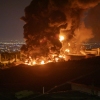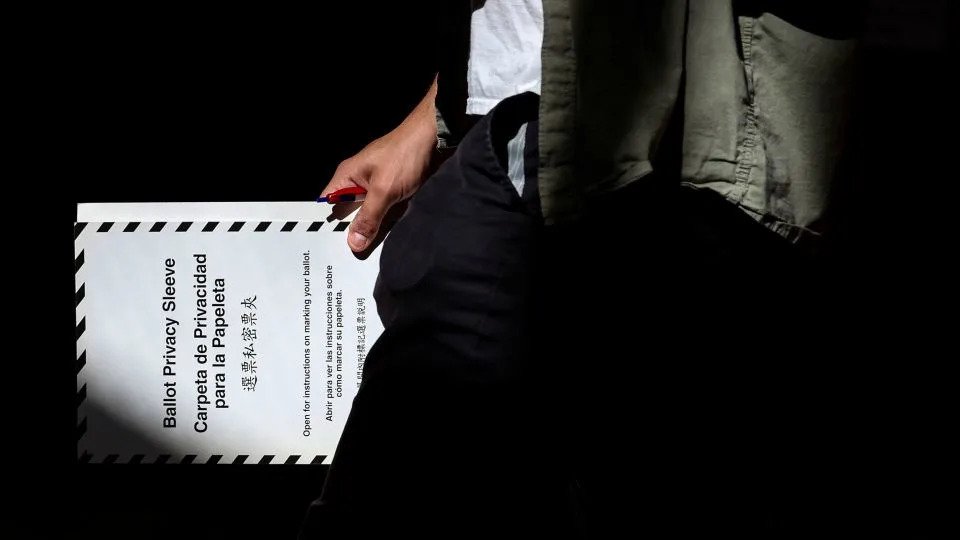
Spotlights illuminate a building where four people were killed by an Iranian missile strike on June 24, 2025 in Beersheba, Israel.
Chris McGrath/Getty Images
hide caption
toggle caption
Chris McGrath/Getty Images
A shaky ceasefire between Israel and Iran began to take hold Tuesday under pressure from U.S. President Donald Trump, raising hopes for an end to the region’s most intense military confrontation in decades.
To understand what’s at stake and what might come next, Morning Edition spoke with Jonathan Panikoff, a former intelligence officer who now directs the Scowcroft Middle East Security Initiative at the Atlantic Council, a Washington-based think tank.
Panikoff says Iran’s military capabilities have been severely degraded and that Israel may be nearing its own limits after days of missile exchanges. He also sees the potential for diplomacy, possibly mediated by countries like Oman or even China. But Panikoff warns that a broader solution to Iran’s nuclear ambitions remains elusive. “The balance of power in the region has certainly shifted towards Israel’s favor and away from Iran,” he said.
Panikoff told NPR’s Michel Martin what he sees as Iran’s diminished deterrence, the uncertain future of nuclear diplomacy, shifting regional dynamics and the potential for deeper ties between Russia and Iran.
This interview transcript has been lightly edited for length and clarity.
Interview highlights
Michel Martin: So, Israel and Iran have been adversaries for decades. Just given everything we’ve already heard so far this morning, do you think the conditions are there, or maybe the incentives are there, to actually hold this ceasefire?
Jonathan Panikoff: I think the incentives are certainly there from Iran. Iran has seen its power significantly reduced in the region. It has seen its ability to defend against Israel, frankly, be obliterated. It just did not exist fundamentally in the way that I think even a lot of Iranian officials thought it was going to. And I think for Israel, after years of war in Gaza and certainly the last 12 days, it’s accomplished most of its objectives to really diminish Iran’s ballistic missile program and nuclear program, and may itself be running out of interceptor missiles to defend against Iran’s missile strikes that we’ve seen [going] into Israel, including overnight.
Martin: So, before Israel began bombing Iran, the U.S. was negotiating with Tehran over its nuclear capabilities. Do you think those negotiations will go forward, and what might we expect from them?
Panikoff: I think that this is probably going to be the beginning of the end, not the end of the end, presuming the ceasefire holds for this conflict, precisely because Iran’s nuclear program is still a question. President Trump may have significantly destroyed, or at least mostly destroyed, Fordo with the strikes, but there are real questions about whether Iran’s highly enriched uranium was ferried out of the site and whether it could ultimately be spun up in a smaller, secretive site and turned into 90 percent weapons-grade enriched uranium. That would be a real threat to Israel. To manage that, either there will need to be further strikes eventually when those sites are found, or there will still need to be some sort of fundamental diplomatic solution.
Martin: I guess that’s what I’m asking you. Do you think that a pathway to that exists?
Panikoff: I think the pathway probably exists indirectly for now. You can imagine that U.S. mediators, like Oman, maybe Norway or the Swiss, could continue to play a role in bringing the parties back to the table. Or you could even imagine an outside actor like China trying to convince the Iranians to come back. So I think that pathway exists, but it’s going to take quite a lot of cajoling over the coming weeks and months.
Martin: So, let’s broaden it out. Two weeks ago, the balance of power in the Middle East looked very different. How would you describe it now?
Panikoff: The balance of power in the region has certainly shifted toward Israel’s favor and away from Iran. And there’s a reason for that. The Iranian triad, on which its power projections were based, was ballistic missiles, its nuclear program and its proxy network. All three of those, over the last year or so, have been tremendously diminished, especially the latter two in the past two weeks of this war. Now I think Iran is really facing a challenge in terms of how it’s going to move forward. Will it reinvest billions of dollars to rebuild those entities at a time when its economy is struggling, which could lead to even further internal strife? Or will it try a different path, rebuilding some defenses over time, but not reestablishing the same proxy network or nuclear program that has long been a broad threat to the region, including Arab Gulf states?
Martin: What about Russia? Russia has been an ally of Iran for years, and of course, I think the world knows Russia has been tied down in its war against Ukraine. It has lost many people, lots of munitions and so forth. What happens to Russia now? What’s its role here?
Panikoff: I think there’s a real reason to be concerned over the long term about whether the nature of the relationship between Russia and Iran, which has largely been transactional, becomes much more strategic. If both Russia and Iran are viewing themselves as isolated on the world stage, they may decide there is more reason to work together. That could mean Russia reengaging with Iran and eventually deciding to provide defense systems again or ballistic missiles again.








